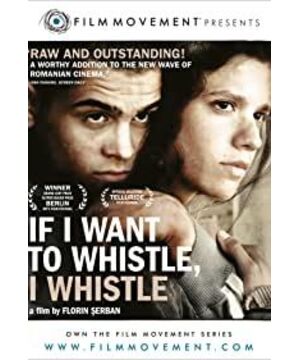As director Florin Saipan’s screen debut, "Blowing, Blowing Loudly" is the film’s debut. Although the film still has some traces of incompleteness, it is better than the fresh and introverted style, the unique life documentary image format. The shooting method of the documentary is brought to the extreme: natural lighting, simultaneous recording, few background music, and the audience can hear only the noise of the environment and the human voice. Undoubtedly, the purpose of making the film into a documentary is to give viewers a strong sense of substitution, and it is also a narrative method that is closely related to the subject matter of the film, because the spirit of the film is to reflect those who are accepted and re-received within the high walls of the correctional institution. The real life and mental journey of young offenders who are educated and regulated during adolescence.
Prior to this, in 2009, Jacques Odía’s "Prophet" also used the same method of filming, and the subject matter was somewhat similar, but the style was more intense and mature: After entering adulthood, the Arab youth Gibena was in French prison His own Corsican mentor seeks mutual benefits. He wisely and coldly survives, and through mutual affiliation with the mafia outside the sky prison, he finally becomes a mafia important member. The film mainly discusses the prison culture of fierce fighting and rivalry between the racial conflicts represented by small groups in a closed space where small groups have their own rules and systems. "Blow as you want, and blow loudly" is a relatively "dumb" in the inner quality of the theme: there is no underworld force in the prison to respond and spread power, and there is no smell of gunpowder between prison guards and prisoners. The confrontation between prisoners and the law of survival among prisoners have not been over-proclaimed. More attention is paid to the social phenomenon that half-aged children who are underage or have only become "quasi" adults have become "problem teenagers" because of the neglect of education and care in their families. In Romania, an Eastern European country, this has become an urgent social problem that needs to be resolved.
Generally speaking, for films that touch on socially sensitive topics, many directors like to use implicit, unpretentious and relatively objective lens language to state facts and social phenomena, leaving questions and doubts to the audience to think about, and they can often receive ideas. Unexpected shocking effects, in fact, the directors use the lens and video mode that do not express their own opinions, sometimes it is an attitude based on the standpoint of a third party to calmly examine the audience's reactions. "Blow as you want, blow loudly" is to follow this line.
I found that many of the film’s shooting viewpoints were followed by Sylvie’s back shoulders, just like a reporter framing the scene and following the interviewed characters. It is very real, without the contrived sense of embellishment and sculpting. When I first watched the film, I was a little bored because I hadn't figured out the director's thoughts and intentions. But the audience's viewing habits will be adjusted with the rhythm of the film. Under the original ecological image like a fragment of life, it is actually an undercurrent surging. The plot is simple and powerful, and the plot arrangement is contagious. It is necessary to slowly incubate emotions and lay out the details for the next emotional outburst. Appropriate explanation and rhetoric.
The film was shot in a closed correctional facility, which is a micro-social group. The children work, sing, work, rest, and eat together. When there is joy, there are also battles of conquest between the males, but they are all small troubles, and then everything is calm. The male protagonist Sylvie’s image is set to be somewhat neurotic. He always likes to stare directly at people. Sometimes he likes to chatter. The seemingly gentle appearance is actually a suppressed violent child. This is a manifestation of suffering from mental trauma. It is a pity that a tragic incident happened a few days before he was about to be released from prison. Naturally, the mother was the fuse of the whole incident. Her appearance broke Sylvie's peaceful life, and the scars of the soul that had been healed with great difficulty were once again uncovered by the skin. Over the years, his mother ignored him and his younger brother for the livelihood and the ever-changing lover, causing his life to be ruined. Now he is taking away his close brother. So he planned a kidnapping case.
Often when people are about to reach the end of freedom, a small matter will make all their efforts and hard work fall short. This kind of life story with no control over the future can make the audience feel sad and helpless. Another aspect that prompted Sylvie to take the risk was that the social re-education organization ignored his human rights requirements: the warden refused to approve his repeated petitions to return home to visit relatives. A teenager who is still immature in mind can easily go to extremes at this time. The spiritual appeal of the film covers two social issues: Romania’s worrisome economic situation, many parents with children go out to work in Western developed countries to earn money, who should provoke the burden of nurturing and nurturing their children. In this special period, children Sylvie’s mind is very fragile and vulnerable to external temptations. Sylvie represents an individual in this group to extend the worrying consequences caused by the above phenomenon; on the other hand, it alludes to the correctional home. This represents the institutional chaos of the social system and the correctional organization and the negligence of the re-education and guardianship of the teenagers during the psychological transition period. The cause and effect of the boy Sylvie's reckless implementation of the risky plan are all caused by the comprehensive problems of the society.
I was thinking that the reason why Sylvie chose social worker Anna as the kidnapper was not blindly. This should be a more complicated sentiment in it: love and revenge after being ignored. I admired Anna's beauty, but the other party ignored her, so she was secretly injured in her heart. There is even a little bit of hatred towards women's subconscious, because his mother, he used to rant and scold her mother as a "bitch", she ruined his own future, and let him fend for himself. But, after all, Sylvie is a kind-hearted child. When he kidnapped the hostages, he knew exactly what he wanted, so he was sensible under impulse. Sylvie, a rebellious young man, is a complex of contradictions: calm and depressed, bursting out like a lion, gentle and a little sensitive and fragile, and his heart is closed. He has both violent factors and natural kindness in his body. The shaping of this role image is that the director intends to arouse the sympathy and compassion of the audience: he is still a child, but unfortunately is reduced to the edge of society.
The final outcome can be imagined, because as far as Sylvie's daring character is concerned, he knows that he can't escape justice. However, at least he used this extreme way to fulfill the two big wishes in his heart. But the long journey of life has to be spent under the bleak bars. How could it be a pity?
Because it is made into a documentary, it is closer to the narrative of the ordinary details of daily life, and the content of the script is relatively simple. Compared with the plot, it is less attractive and tension of tension and excitement. However, the warm fire slowly simmers the work, the plot of the early stage of the film and the foreshadowing of the character's personality broke out after the kidnapping case was sublimated and silenced in the last half hour. In the half-hour tense scene, there are some logical details that need to be considered: the kind of back-to-back fight between the betrayal of the relatives, and the rendering of the idealized rebellious individual heroism. Generally speaking, this is an independent film that does not conceal its flaws.
After watching the film, I personally think that this film won the Silver Bear Award of the Jury at the 60th Berlin Film Festival: It is like a loud and simple whistle: If I Want to Whistle, I Whistle!
View more about Eu cand vreau sa fluier, fluier reviews









